
Indoor Air Pollution Can Affect Your Health: Here’s What You Can Do About It
Alabama has made great strides in improving outdoor air quality during the past year. According to the 2018 American Lung Association’s State of the Air report, Alabama has earned improved grades for the US’ most widespread air pollutants. But while the focus has been placed on outdoor pollution and its effects on public health, it has been found that the air inside our homes also contains harmful elements that can pose serious health risks. Whether you’re living in a luxury home in Baldwin County or in a condo in Orange Beach, it’s important to keep the air inside your home as clean and pure as it can be to prevent the risks of developing certain health conditions. Here’s what you need to know about indoor air pollution and how it can affect your health, and what you can do to remedy the problem.
What causes indoor air pollution?
Indoor air contains a mix of pollutants coming from outside (think vehicular and industrial emissions) and contaminants from inside the home. Pets can also bring outdoor pollutants into homes, as their fur can trap pollen, fungi and all kinds of bacteria. Emissions from heating and cooling systems, as well as smoke coming from burning candles, tobacco products and fireplaces can all contribute to poor air quality. Mold and mildew are also some of the leading causes of indoor air pollution. Meanwhile, commercially available cleaning products and air fresheners can leave particles in the air that can be potentially harmful to your health. Getting rid of or limiting air pollutants should be a priority to prevent health symptoms and conditions.
Signs that your indoor air is polluted
There are several ways to know if your indoor air is polluted. The presence of stale or stuffy odors that never seem to go away is one indication of poor air quality. Also, be on the lookout for mold and mildew - if your paint or wallpaper is constantly peeling, that’s a sign that the humidity levels in your home are unusually high, and this can lead to mold growth. Unpleasant smells coming from your air conditioner unit, heating systems or chimney also indicate the presence of air pollutants in your home. However, experiencing changes in your health is the most obvious sign of polluted indoor air, so it's important to observe yourself and your loved ones for symptoms.
Health symptoms to look out for
Indoor air pollution can cause a host of health symptoms, and the most common is having colds or nasal congestion, according to the United States Environmental Protection Agency. Also, if you find yourself constantly sneezing in your home even though you don’t have a cold, then your indoor air may be the cause of that. Worsening of asthma symptoms and having a constant cough are also clear signs of indoor air pollution. Though these symptoms may not seem too serious, it’s important to know that prolonged exposure to poor indoor air quality can lead to other health problems, such as having a lack of focus, memory problems, and constant headaches and dizziness.
Cleaning up your indoor air
The first thing to do to purify the air in your home is to air it out well. Open doors and windows to let the air circulate, but try to do this early in the morning when there’s less traffic outside. You can also place ceiling or stand fans in overly hot rooms to improve ventilation. Meanwhile, installing exhaust fans in perpetually damp areas such as the bathroom and basement can help to lower humidity levels and prevent mold growth. Pet owners should also consider using a HEPA filter to reduce the amount of dander, pollen and dust mites inside the home.
A change in lifestyle may also help to purify indoor air. Smoking or vaping can cause lung disease, even among those who don’t smoke or vape, so quitting these unhealthy habits can help to protect everyone inside the home. Using natural cleaning products, such as vinegar, water and baking soda, can also help to reduce indoor air pollutants.
Improving your indoor air quality can help to ensure your family’s well-being. Do your part to reduce indoor air pollution for a safe and healthy home.
Article by Alicia Rennoll




